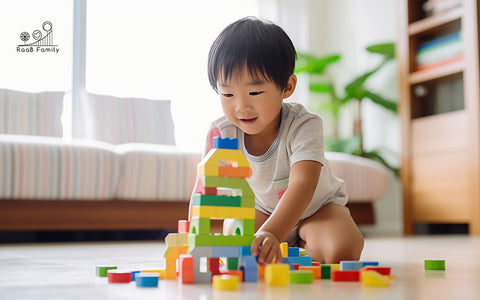It’s not uncommon for parents to be consumed with worry about their children’s growth and development because, ultimately, they only seek what's best for their kids. In order to help their children excel in all aspects of life, many parents go to great lengths to impart knowledge and skills to their kids from a young age. However, these methods may not always yield the desired results.
Instead of implementing structured education, it’s actually more effective to encourage learning through play. In fact, research has shown that playtime can enhance early development by 33% to 67%.
Not convinced? Here’s more on the importance of unstructured play for infants.
1. Stimulates Cognitive Development
Unstructured playtime challenges children’s minds to think beyond the immediate. During creative play, whether it’s through playing house or building a fort out of cushions and blankets on the play mat, their minds work hard to construct scenarios and narratives that cultivate abstract thinking. This aids your baby in their development, helping them discover new ways to have fun while bolstering their creativity.
Such cognitive stimulation through play also creates opportunities for your child to pick up problem-solving skills. Challenges that they face, such as when solving puzzles or figuring out how to balance a tower of blocks, can strengthen their critical thinking skills and better equip them for more complex issues in their later years.
2.Helps with Language Development
Babies also encounter new objects and experiences during playtime that can aid in language development. As they engage with their surroundings, whether it’s within a kids’ playhouse, a playpen, or even in an open space, they are exposed to numerous unfamiliar objects that can expand their vocabulary. When accompanied by guidance, parents can help their children develop stronger language skills successfully.

Children also tend to express themselves during play while listening actively to the conversations happening around them. These interactions develop their listening and communication skills. Some of the activities, such as drawing, scribbling, or playing with letter and number toys, can even improve their reading and writing abilities.
3. Supports Development of Fine and Gross Motor Skills
The diverse range of physical activities and experiences that children get to explore during playtime challenges and strengthens their muscle groups to refine their motor abilities and coordination.
From running and jumping to throwing or catching a ball, these movements stimulate the development of large muscle groups in areas like the legs and core. This, in turn, improves balance, agility, and overall fitness, as well as enhances hand-eye coordination and spatial awareness.
Other activities such as climbing up an indoor slide for kids, running around at a kids’ swing and slide playground, dancing to upbeat tunes, and tackling obstacle courses, also foster stronger gross motor skills.

To target your children’s fine motor skills, activities that require precise hand movements and finger dexterity are some options you can consider. These include building blocks, arts and crafts, and cooking and baking.
4. Fosters Emotional Connections
Moments of laughter and imagination during playtime nurture emotional connections between you and your children. These sessions offer parents an opportunity to fully engage with their kids, building strong bonds and trust vital for social and emotional growth. These are crucial if you want your children to be able to develop healthy relationships with others as they mature. Skills such as being able to trust others and knowing how to recognise and respond to people’s emotions effectively are built upon during these early years.
5. Enhances Sensory Perception
From the vibrant colours and textures of baby mats and playpens to the fun and interesting structures of kids’ playhouses, playtime provides a stimulating environment that enhances your children’s sensory perception in multiple ways.
Sensory play for infants engages their five senses and various parts of the brain. As they explore their surroundings, their brain processes and organises information to promote neural connections and cognitive development. This not only refines their sensory receptors, but also cultivates their problem-solving and critical-thinking skills.

Playtime is essential for a child’s healthy development and growth, and is a powerful tool that can nurture a child’s mind, body, and soul in ways that structured lessons alone cannot achieve. If you want to help your child grow happily and healthily, then it’s time to start incorporating playtime into your child’s daily routine.
Create a Safe Play Environment with RaaB Family
Give your children the secure and enriching playtime they deserve with our range of children’s play products, such as baby play mats, playpens, and slides, designed with their safety and development in mind. Build the ideal play environment today. Shop here!

